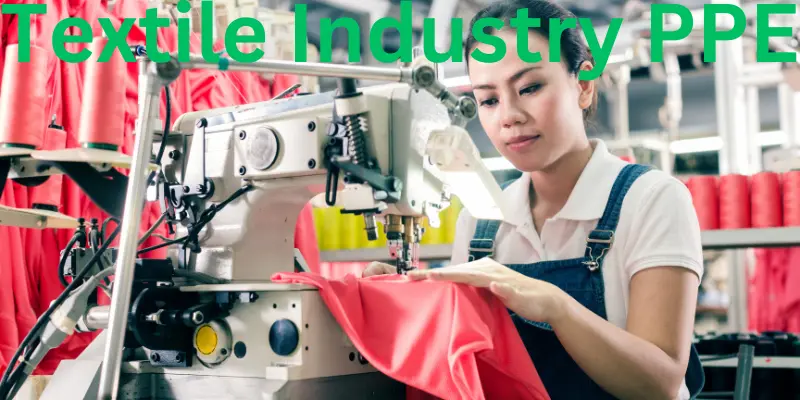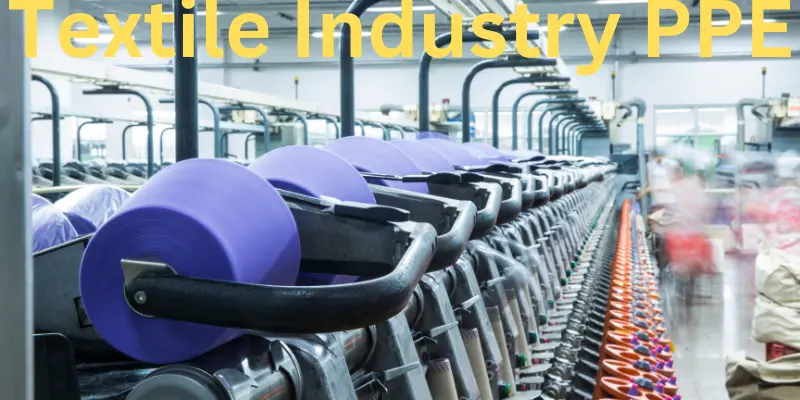Top 10 Textile Industry PPE and Manufacturers: Safeguarding Workers
Updated: 24-Dec-2024
718
The textile industry’s PPE plays a crucial role in the global economy, employing millions of workers worldwide. However, the nature of the work exposes employees to various hazards, making personal protective equipment (PPE) essential. This article delves into PPE’s importance, history, and benefits in the textile industry while exploring its evolution, advantages, and challenges.

Personal Protective Equipment (PPE) is specialized clothing or gear designed to protect individuals from workplace hazards. Common examples include gloves, masks, goggles, helmets, and protective suits. PPE acts as the last line of defense against risks such as chemical exposure, physical injuries, and biological hazards.
1. Why Textile Industry PPE Is Important
PPE is indispensable for ensuring worker safety and preventing accidents in hazardous environments. It reduces the likelihood of injuries, illnesses, and fatalities, thereby fostering a safer workplace. By minimizing risks, PPE also enhances productivity and compliance with occupational safety regulations.
1. Background of Textile Industry PPE
The concept of PPE dates back centuries, with early examples like medieval armor designed to shield soldiers. In industrial contexts, the need for worker protection became evident during the Industrial Revolution. Over time, advancements in materials science and engineering have led to more effective and specialized PPE tailored to various industries, including textiles.
2. Benefits of Textile Industry PPE
- Protection from Chemicals: Shields workers from exposure to dyes, solvents, and other hazardous chemicals.
- Dust and Fiber Safety: Prevents respiratory issues caused by inhaling textile dust and fibers.
- Reduced Injuries: Minimizes the risk of cuts, burns, and other physical injuries.
- Enhanced Comfort: Modern PPE is designed for ergonomics, ensuring ease of movement.
- Compliance: Helps businesses adhere to safety standards and regulations.
- Reduced Absenteeism: Fewer injuries and illnesses mean lower employee absenteeism.
- Increased Productivity: A safe workforce is a more efficient one.
- Environmental Safety: Prevents cross-contamination when dealing with hazardous materials.
- Durability: High-quality PPE withstands wear and tear in demanding conditions.
- Cost Savings: Long-term reduction in compensation claims and medical expenses.
3. Importance of Textile Industry PPE
The textile industry involves various processes like spinning, weaving, dyeing, and finishing, each with its hazards. PPE ensures that workers are protected from:
- Chemical Hazards: Toxic substances used in dyeing and bleaching.
- Mechanical Risks: Injuries from heavy machinery.
- Thermal Exposure: Burns from high-temperature operations.
- Respiratory Issues: Inhalation of fine fibers and dust.
4. Usage of Textile Industry PPE: Past, Present, and Future
- Past: Basic protective gear like aprons and gloves was used to prevent injuries. Awareness of workplace safety was minimal.
- Present: Advancements have led to specialized PPE with features like chemical resistance and enhanced breathability. Regulatory compliance has also improved.
- Future: Innovations like smart PPE equipped with sensors to monitor worker health and safety conditions are on the horizon.
2. Pros and Cons of Textile Industry PPE
Textile industry PPE
1. Pros
- Prevents workplace injuries.
- Enhances worker confidence.
- Reduces long-term healthcare costs.
- Improves regulatory compliance.
- Customizable for different tasks.
- Promotes a safety-conscious culture.
- Boosts overall productivity.
- Environmentally friendly options are emerging.
- Durable and long-lasting.
- Supports emergency preparedness.
2. Cons
- Initial costs can be high.
- Discomfort if poorly designed.
- Improper usage reduces effectiveness.
- Maintenance requirements.
- Limited shelf life for certain materials.
- May restrict mobility.
- Training is required for proper use.
- Potential environmental impact of disposal.
- Not foolproof against severe hazards.
- Over-reliance can lead to negligence in other safety measures.
3. 10 Textile Industry PPE companies, along with a list of their key products
PPE companies
1.3M
3M, established in 1902, is a multinational conglomerate headquartered in St. Paul, Minnesota, USA. With a diverse portfolio, 3M employs over 90,000 people globally and is renowned for its innovation in various sectors, including personal protective equipment for the textile industry. Their annual production includes millions of PPE items designed to enhance worker safety.
Textile Industry PPE Key Products:
- Respirators
- Protective eyewear
- Hearing protection devices
- Disposable coveralls
- Chemical-resistant gloves
- Safety helmets
- Fall protection equipment
- Welding helmets
- Reflective vests
- Safety footwear
2. Honeywell International Inc.
Founded in 1906, Honeywell is a global technology company based in Charlotte, North Carolina, USA. The company employs approximately 110,000 individuals worldwide and offers a comprehensive range of PPE solutions tailored for the textile industry. Honeywell’s annual production capacity includes a vast array of safety equipment designed to protect workers in various environments.
Textile Industry PPE Key Products:
- Safety goggles
- Nitrile gloves
- Hard hats
- Earplugs
- Protective clothing
- Respiratory masks
- Safety harnesses
- Chemical splash goggles
- Cut-resistant gloves
- Face shields
3. DuPont
DuPont, established in 1802, is headquartered in Wilmington, Delaware, USA. With a workforce of over 30,000 employees, DuPont is a leader in the development of advanced PPE materials and products for the textile industry. Their annual production includes a wide range of protective garments and equipment designed to meet stringent safety standards.
Textile Industry PPE Key Products:
- Tyvek® protective suits
- Nomex® flame-resistant clothing
- Kevlar® cut-resistant gloves
- Chemical-resistant aprons
- Protective sleeves
- Lab coats
- Cleanroom apparel
- Shoe covers
- Arm guards
- Hooded coveralls
4. Ansell Limited
Founded in 1893, Ansell is an Australian company with its headquarters in Richmond, Victoria. Specializing in protective solutions, Ansell employs over 13,000 people globally and offers a wide range of PPE products for the textile industry. Their annual production includes millions of gloves and protective clothing items designed to ensure worker safety.
Textile Industry PPE Key Products:
- Nitrile gloves
- Latex gloves
- Chemical-resistant gloves
- Cut-resistant gloves
- Disposable gloves
- Protective sleeves
- Aprons
- Lab coats
- Surgical gloves
- Industrial gloves
5. MSA Safety Incorporated
MSA Safety was established in 1914 and is headquartered in Cranberry Township, Pennsylvania, USA. With an approximately 5,000-employee workforce, MSA Safety specializes in developing and manufacturing sophisticated safety products for various industries, including textiles. Their annual production includes a broad spectrum of PPE designed to protect workers from hazardous situations.
Textile Industry PPE Key Products:
- Safety helmets
- Respirators
- Gas detection instruments
- Fall protection equipment
- Protective eyewear
- Hearing protection devices
- Face shields
- Thermal imaging cameras
- Escape respirators
- Confined space equipment
6. Kimberly-Clark Professional
Kimberly-Clark Professional, a division of Kimberly-Clark Corporation founded in 1872, is based in Irving, Texas, USA. Employing over 40,000 people worldwide, the company provides essential PPE products for the textile industry, focusing on safety and hygiene. Their annual production includes a vast array of disposable protective equipment designed for various industrial applications.
Textile Industry PPE Key Products:
- Disposable gloves
- Protective coveralls
- Face masks
- Safety glasses
- Shoe covers
- Hairnets
- Lab coats
- Wipes
- Respirators
- Aprons
7. Lakeland Industries, Inc.
Founded in 1982, Lakeland Industries is headquartered in Decatur, Alabama, USA. With a global workforce, the company specializes in manufacturing high-performance protective clothing for industries including textiles. Their annual production includes a wide range of safety garments designed to protect workers from hazardous conditions.
Textile Industry PPE Key Products:
- Chemical protective suits
- Fire-resistant clothing
- High-visibility apparel
- Arc flash protective gear
- Disposable coveralls
- Lab coats
- Protective aprons
- Sleeves
- Hoods
- Shoe covers
8. Portwest
Established in 1904, Portwest is an Irish company headquartered in Westport, County Mayo, Ireland. With over 5,100 employees, Portwest is a global manufacturer and innovator of workwear, safety wear, and PPE, serving various industries including textiles. Their annual production includes a comprehensive range of protective clothing and equipment designed to meet international safety standards.
Textile Industry PPE Key Products:
- Flame-resistant clothing
- High-visibility apparel
- Safety footwear
- Work gloves
- Hard hats
- Hearing protection
- Respiratory masks
- Protective eyewear
- Rainwear
- Disposable coveralls
9. Alpha Pro Tech, Ltd.
Alpha Pro Tech, founded in 1983, is headquartered in Markham, Ontario, Canada. The company focuses on developing and manufacturing high-quality PPE products for various industries, including textiles. With a dedicated workforce, their annual production includes a variety of protective apparel and equipment designed to ensure worker safety.
Textile Industry PPE Key Products:
- Face masks
- Bouffant caps
- Shoe covers
- Lab coats
- Coveralls
- Beard covers
- Hoods
- Gowns
- Sleeves
- Face shields
10. Sioen Industries NV
Founded in 1960, Sioen Industries is headquartered in Ardooie, Belgium. With over 4,500 employees, the company is a leading manufacturer of technical textiles and professional protective clothing, serving various industries. Their annual production comprises a wide range of safety garments and PPE designed for hazardous environments.
Textile Industry PPE Key Products:
- Flame-retardant clothing
- Chemical-resistant suits
- High-visibility apparel
- Protective rainwear
- Safety gloves
- Work boots
- Disposable coveralls
- Industrial aprons
- Safety harnesses
- Respiratory protection masks

4. FAQs About Textile Industry PPE
- What is PPE? PPE stands for Personal Protective Equipment, designed to safeguard workers from workplace hazards.
- Why is PPE essential in the textile industry? It protects workers from chemical exposure, respiratory issues, and physical injuries.
- What types of PPE are used in textiles? Gloves, masks, goggles, aprons, and safety shoes.
- How has PPE evolved? From basic protective gear to advanced, ergonomically designed equipment.
- What are the regulations for PPE? Standards vary by region, but OSHA and ISO guidelines are commonly followed.
- How should PPE be maintained? Regular cleaning, inspection, and proper storage.
- What innovations are expected in PPE? Smart PPE with sensors for health monitoring and hazard detection.
- What challenges do workers face with PPE? Discomfort, improper fit, and maintenance issues.
- How does PPE benefit employers? Improved safety records, reduced costs, and enhanced productivity.
- Can PPE replace other safety measures? No, it should complement other safety protocols.
5. Conclusion
Textile Industry PPE is the cornerstone of worker safety in the textile industry, offering protection against numerous hazards. While it has its challenges, the benefits far outweigh the drawbacks. Textile companies can ensure a safer and more productive work environment by investing in high-quality PPE and training. The evolution of PPE, especially with technology integration, promises an even brighter and safer future for the industry.
Please Write Your Comments